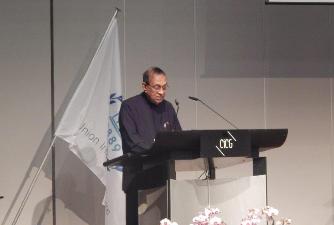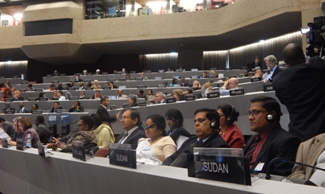

Leading a high-level Sri Lankan Parliamentary delegation to the 135th Assembly of the Inter-Parliamentary Union (IPU) being held from 23-27 October 2016 in Geneva, Hon. Karu Jayasuriya, Speaker of the Parliament of Sri Lanka addressed the General Debate this morning (25 October 2016). The theme of this year’s debate was ‘Human Rights abuses as precursors of conflict: Parliaments as early responders.’
Sri Lanka delegation included Hon. Nimal Siripala De Silva, M.P., Minister of Transport and Civil Aviation, Hon. Vijitha Herath, M.P., Hon. (Mrs.) Rohini Kumari Wijeratne, M.P., Hon. Velu Kumar, M.P. and Mr. Dhammika Dasanayake, Secretary-General of Parliament.


The International Organization on Migration (IOM) has expressed readiness to further enhance its assistance to Sri Lanka, by providing training and capacity building support for the Ministries of Foreign Employment and Foreign Affairs, and to the Sri Lanka Foreign Employment Bureau (SLBFE). It was agreed to extend cooperation in the areas of countering human trafficking and people smuggling operations, providing short-term internship opportunities with the IOM for the relevant officials as well as supporting the upgrading of the consular services of the Ministry of Foreign Affairs. The IOM also pledged to continue technical and secretarial support for the Colombo Process (CP) - the regional consultative forum of contractual labour originating countries in Asia, currently chaired by Sri Lanka.
These assurances were given when Minister of Foreign Employment Thalatha Atukorale who was in Geneva last week to attend the 6th Global Meeting of Chairs and Secretaries of Regional Consultative Processes on Migration met with the Director General of IOM Ambassador William Lacy Swing, to discuss and follow up progress on Sri Lanka’s bilateral cooperation with the IOM. Sri Lanka’s Permanent Representative to the UN in Geneva Ravinatha Aryasinha, Deputy Permanent Representative Samantha Jayasuriya, Counsellor Shashika Somaratne, and Acting Deputy General Manager of the Foreign Employment Bureau D.G.G.S. Yapa, were associated with the Minister.



The Minister of Foreign Employment Thalatha Atukorale, who is also the Chair in Office of the Colombo Process (CP), the regional consultative forum of contractual labour originating countries in Asia has said, Sri Lanka is providing leadership for the CP to be a bridge between labour sending and receiving countries fostering strong partnership for the Asian region. She said “the CP will soon agree on the role it can play in supporting the overall implementation of the Sustainable Development Goals (SDGs) related to migration with a specific focus on contractual labour migrants”, “benefitting from the experience of having worked on issues such as ethical labour recruitment, migrant health and remittances over the past 2 years.” The Minister said “in the forthcoming negotiations on developing the ‘Global Compact on Migration by 2018’ the CP should be ready to engage constructively, building on the SDGs framework.”


The UN High Commissioner for Refugees Filipo Grandi, has said the UNHCR “will continue to work on, the return of those Sri Lankans that wants to return, solutions for internally displaced people and commendable work that the Government is doing for the statelessness”. The High Commissioner made this observation, in response to the national statement of Sri Lanka delivered by Sri Lanka's Permanent Representative to the UN in Geneva Ravinatha Aryasinha, at the 67th Session of the Executive Committee of the UNHCR, held in Geneva this week.


Sri Lanka on Wednesday ( 5 October 2016) became the 24th country to accede to the Marrakesh Treaty to Facilitate Access to Published Works for Persons Who Are Blind, Visually Impaired or Otherwise Print Disabled. Sri Lanka’s Permanent Representative to the UN in Geneva Ambassador Ravinatha Aryasinha, handed over the instrument of accession to the Director General of the World Intellectual Property Organization (WIPO) Dr. Francis Gurry, during the ongoing 56th Series of Meetings of Assemblies of the Member States of WIPO, 3-11 October 2016 in Geneva.
More than 75 WIPO member states have signed the Treaty, which entered into force on 30 September 2016, 3 months following the ratification of the 20th country. The Marrakesh Treaty is envisaged to facilitate the availability of published works in accessible formats for the people who are blind, visually impaired, and print disabled. – such as Braille - through limitations and exceptions to the rights of copyright right holders. The Treaty is also designed to provide assurances to authors and publishers that their published works will not be misused or distribution to anyone other than the intended beneficiaries.

Director General of the World Health Organsiation Dr. Margaret Chan commended the efforts made by the President Maithripala Sirisena in his capacity as the former Minister of Health in advancing the health sector in Sri Lanka. The Director General made these remarks at a side –event on Non – Communicable Diseases (NCDs) which was attended by President Sirisena on the side – lines of his visit to the 71st Session of the United Nations General Assembly on 22nd September 2016.
The event which was co –hosted by the Government of Russia and the World Health Organisation(WHO) launched the Friends of the United –Nations Inter – Agency Task Force on prevention and control of NCDs initiative and provided an overview of the current work of the Task Force, showcasing action at country level, discuss on supporting Member States to achieve the NCD-related Sustainable Development Goals, and outlining a number of global joint programmes that now require funding in order to become operational.

Sri Lanka as the current Chair of the Asia-Pacific Forum on Sustainable Development, is committed to see expedited transformation into sustainable development. In our own country, a National Sustainable Development Act in conformity with the SDGs is scheduled to be tabled in the Parliament soon. The objective of this new Act is to formulate a National Policy and Strategy on Sustainable Development and to provide the necessary legal and institutional framework for developing and implementing it.
